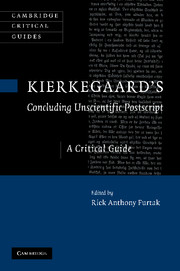Book contents
- Frontmatter
- Contents
- List of contributors
- Acknowledgments
- List of abbreviations
- Introduction
- 1 The “Socratic secret”: the postscript to the Philosophical Crumbs
- 2 Kierkegaard's Socratic pseudonym: A profile of Johannes Climacus
- 3 Johannes Climacus' revocation
- 4 From the garden of the dead: Climacus on interpersonal inwardness
- 5 The Kierkegaardian ideal of “essential knowing” and the scandal of modern philosophy
- 6 Lessing and Socrates in Kierkegaard's Postscript
- 7 Climacus on subjectivity and the system
- 8 Humor and irony in the Postscript
- 9 Climacus on the task of becoming a Christian
- 10 The epistemology of the Postscript
- 11 Faith and reason in Kierkegaard's Concluding Unscientific Postscript
- 12 Making Christianity difficult: The “existentialist theology” of Kierkegaard's Postscript
- Bibliography
- Index
5 - The Kierkegaardian ideal of “essential knowing” and the scandal of modern philosophy
Published online by Cambridge University Press: 04 August 2010
- Frontmatter
- Contents
- List of contributors
- Acknowledgments
- List of abbreviations
- Introduction
- 1 The “Socratic secret”: the postscript to the Philosophical Crumbs
- 2 Kierkegaard's Socratic pseudonym: A profile of Johannes Climacus
- 3 Johannes Climacus' revocation
- 4 From the garden of the dead: Climacus on interpersonal inwardness
- 5 The Kierkegaardian ideal of “essential knowing” and the scandal of modern philosophy
- 6 Lessing and Socrates in Kierkegaard's Postscript
- 7 Climacus on subjectivity and the system
- 8 Humor and irony in the Postscript
- 9 Climacus on the task of becoming a Christian
- 10 The epistemology of the Postscript
- 11 Faith and reason in Kierkegaard's Concluding Unscientific Postscript
- 12 Making Christianity difficult: The “existentialist theology” of Kierkegaard's Postscript
- Bibliography
- Index
Summary
According to the Concluding Unscientific Postscript, the scandal of modern philosophy is not that it has attempted unsuccessfully to prove the reality of the objective world, but that it has failed to offer the kind of knowledge that “essentially relates to existence” (CUP 166). In other words, it does not promote or facilitate a mode of subjective thinking that would be appropriate for human beings in pursuit of wisdom. This complaint motivates the appeal for an alternative to modern speculation that dominates the central portions of the Postscript. Although this work takes issue with many recent trends in philosophy, it ultimately aims not to oppose philosophy but to renew the philosophical tradition.
THE ANCIENTS AND THE MODERNS
Kierkegaard's affinity for ancient philosophy is widely recognized. Both he and his pseudonyms often refer to the ancient Greeks as a point of comparison when disparaging more recent philosophers. As Louis Mackey has noted, Kierkegaard's “rejection” of modern philosophy is inversely related to his “veneration for the Greeks,” and one major goal of his authorship is to reinstate a classical model of philosophical thought and practice. This has less to do with any specific position defended during ancient times than it does with the spirit of ancient philosophy, as Kierkegaard quite correctly understood it. For the Greeks, philosophy was primarily a mode of life guided by the love of wisdom, a reflective discipline oriented toward the end of illuminating human existence.
Keywords
- Type
- Chapter
- Information
- Kierkegaard's 'Concluding Unscientific Postscript'A Critical Guide, pp. 87 - 110Publisher: Cambridge University PressPrint publication year: 2010

